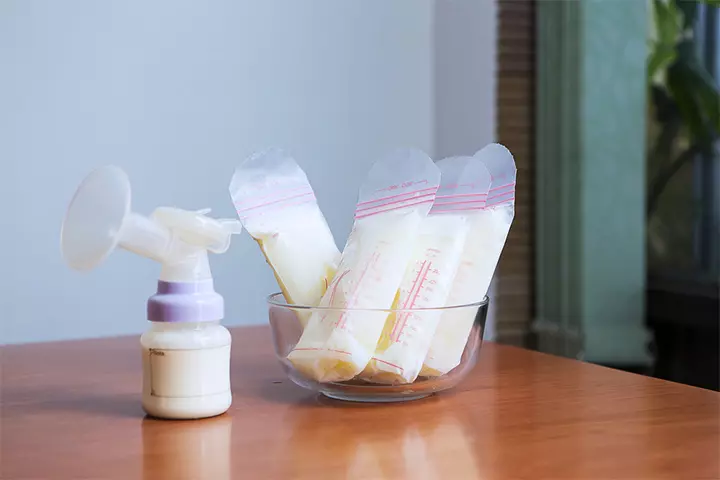
Image: Shutterstock
A mother’s milk is the only source of nutrition for infants. Not only does breastfeeding keep the baby fed and happy, it also helps improve the immunity, overall health and growth of the baby. So, it’s important that mothers provide their little ones with the required amount of feeding. However, breastfeeding might not always be convenient for mothers. For mothers who have to go to work and leave their babies with others, it might not be possible to come back from the office in between to feed their babies. Others might feel uncomfortable feeding their babies in public places. Whatever the situation is, a breast pump is a great option for such instances. A breast pump lets you pump the milk and store it in bottles beforehand.

There may be many other reasons too for requiring a breast pump. It could be because your baby has a problem latching, or maybe your milk supply is a little low. Sometimes, it could be because you have traveling plans, and you want to make it convenient for both you and your baby. No matter what the reason, a breast pump can be a helpful instrument for breastfeeding your child. Therefore, it’s important to get a good one.
Asking yourself why you require a breast pump and how it will help you will ensure that you pick the best breast pump for yourself. So let’s get started:
1. What Type Of Breast Pump Works For You?

Image: Shutterstock
Before you go ahead and settle on one particular breast pump, you need to decide on which one works best for you, as per your needs. There are different types of breast pumps, and they’re as follows:
- Hospital-Grade Breast Pumps

Image: Shutterstock
You won’t need this for personal use, but it’s good to know that they’re available. Hospital-grade breast pumps are primarily used for more than one person, such as in a hospital or clinic. They’re on the more expensive side, and organizations prefer this as it provides long-term use.
- Electric Breast Pumps

Image: Shutterstock
These are your typical breast pumps, except they run on electricity, so you don’t have to pump manually. All you have to do is hook them on to yourself and connect to a plug point. They come as single pumps so that you can pump one breast at a time, or as double pumps, for both your breasts.
- Wearable Electric Breast Pumps

Image: Shutterstock
Wearable electric breast pumps are quite like the previously mentioned ones, except this one doesn’t have to be plugged into an electrical outlet, so there’s no worrying about tubes or wires. They’re portable so that you can carry them everywhere. You don’t have to manually pump your breast milk, as these wearables run on batteries, which you can change at any time.
- Manual Breast Pumps

Image: Shutterstock
This is your good old breast pump. Manual breast pumps, as the name suggests, require you to pump your breast milk manually. They aren’t noisy, so you don’t have to worry about noise, unlike the electric ones. Also, they’re inexpensive and a much-preferred option for most. It’s the perfect choice if you’re looking for that occasional pump.
2. How Much Pumping Will You Be Doing?

Image: Shutterstock
You need to ask yourself how dependent you will be on the breast pump when you buy it. If you know that you will be using it extensively, then the electric breast pump is a good option. This way, you won’t have to manually operate it every time you need to use it.
If you’re someone who has to move around a lot, then opt for the wearable electric breast pump, so this way, you won’t have to worry about unavailable electrical outlets. The manual breast pump is perfect if you only need it occasionally, say, for example, if you’re traveling. A manual pump isn’t exactly the best option if you’re using it regularly, multiple times a day, as it can hurt you.
3. Where Will You Be Pumping?

Image: Shutterstock
Another important thing you need to ask yourself is where you will be pumping your milk the most. Will it be at home? Are you on the move continuously, and if yes, will getting access to an electrical outlet be tough? It would be best if you asked all this so it can help you pick the right pump. For stay-at-home moms, the electric pump should work. But for moms who travel often, the wearable one is much better!
4. Does Convenience Matter?

Image: Shutterstock
Ask yourself questions about convenience. Would you want one that isn’t very noisy? Maybe you’re constantly on calls, so you’d prefer one that doesn’t make noise. You can continue to work while you’re at it.
5. Will Insurance Cover This?

Image: Shutterstock
Sometimes, your insurance company will cover breast pumps as well. You will have to check with them regarding this, and this way, you will also know how much will get covered. If you plan on getting this covered through insurance, you may need a prescription from the doctor, as insurance companies might ask for it. Check with them to be sure.
As you might have already guessed, breast pumps are a total lifesaver. For many women, a breast pump will help them in better time management without compromising on providing the best nutrition to their young ones. For office goers or ones who are involved in constant traveling, life without a breast pump is probably too much of a hassle. And when you start asking the important questions as to why exactly you need a breast pump, finding the right device will get all the more easier. After all there are numerous brands, types, techniques etc. which can leave you confused to say the least. When it comes to breast pumps, bigger doesn’t necessarily mean better. Get one that works best for you, keeping in mind the above questions. You could also ask your medical care provider for suggestions. Do you have any suggestions or thoughts on this? Let us know in the comments below!
Community Experiences
Join the conversation and become a part of our nurturing community! Share your stories, experiences, and insights to connect with fellow parents.












